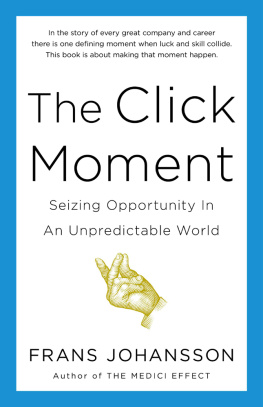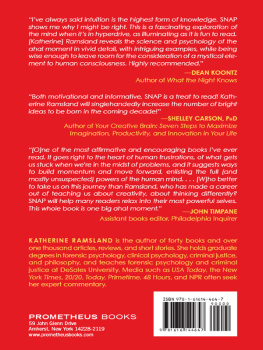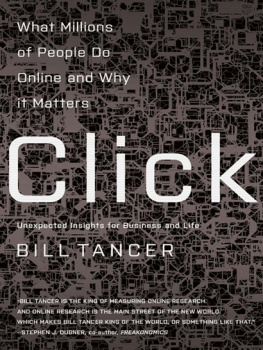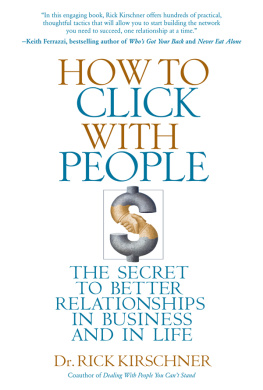THE CLICK MOMENT

THE CLICK
MOMENT

SEIZING OPPORTUNITY IN AN
UNPREDICTABLE WORLD
FRANS JOHANSSON
Portfolio / Penguin
PORTFOLIO / PENGUIN
Published by the Penguin Group
Penguin Group (USA) Inc., 375 Hudson Street,
New York, New York 10014, U.S.A.
Penguin Group (Canada), 90 Eglinton Avenue East, Suite 700,
Toronto, Ontario, Canada M4P 2Y3
(a division of Pearson Penguin Canada Inc.)
Penguin Books Ltd, 80 Strand, London WC2R 0RL, England
Penguin Ireland, 25 St. Stephens Green, Dublin 2, Ireland
(a division of Penguin Books Ltd)
Penguin Books Australia Ltd, 250 Camberwell Road, Camberwell,
Victoria 3124, Australia
(a division of Pearson Australia Group Pty Ltd)
Penguin Books India Pvt Ltd, 11 Community Centre, Panchsheel Park,
New Delhi 110 017, India
Penguin Group (NZ), 67 Apollo Drive, Rosedale, Auckland 0632,
New Zealand (a division of Pearson New Zealand Ltd)
Penguin Books (South Africa) (Pty) Ltd, 24 Sturdee Avenue,
Rosebank, Johannesburg 2196, South Africa
Penguin Books Ltd, Registered Offices:
80 Strand, London WC2R 0RL, England
First published in 2012 by Portfolio / Penguin,
a member of Penguin Group (USA) Inc.
10 9 8 7 6 5 4 3 2 1
Copyright Frans Johansson, 2012
All rights reserved
LIBRARY OF CONGRESS CATALOGING IN PUBLICATION DATA
Johansson, Frans.
The click moment : seizing opportunity in an unpredictable world / Frans Johansson.
p. cm.
Includes bibliographical references and index.
ISBN: 978-1-101-60140-2
1. Success in business. 2. Success. 3. Opportunism (Psychology) I. Title.
HF5386.J59 2012
650.1dc23
2012018019
Printed in the United States of America
Set in Minion Pro
Designed by Elyse Strongin
No part of this book may be reproduced, scanned, or distributed in any printed or electronic form without permission. Please do not participate in or encourage piracy of copyrighted materials in violation of the authors rights. Purchase only authorized editions.
ALWAYS LEARNING
PEARSON
To my wife Sweet Joy and the
amazing and serendipitous journey
we have traveled together
INTRODUCTION
H eading into the fall of 2004, ABC was dead last among broadcast television networks. Then, on September 22, something surprising happened and its fortunes changed. That was the night Lost debuted. The program came out of nowhere and delivered 18.7 million viewers to the struggling network, making it ABCs most-watched dramatic premier in nine years.
In a world of reality shows, Lost was a breath of fresh air. Centering on the survivors from an airliner that crashes on a mystical island, the show seemed like a sure-fire winner. It attracted an incredibly intense fan base that passionately dissected all the clues revealed in each episode. The plot was so intricate that the origin of a smoke monster from the first season wasnt revealed until the sixth. Critics and fans agreed that the islands mythology and the slow unraveling of its central mysteries made the show great. It must have required an incredible amount of planning to even get on the air.
Except the exact opposite was true. Many of the story elements that Lost fanatics loved were ideas the producers thought were too crazy to work. The show, it turns out, was a byproduct of a meeting between Damon Lindelof and J. J. Abrams. At the time, Lindelof was a writer on the modestly successful Crossing Jordan, and Abrams was the creator of the popular series Alias. Lindelof desperately wanted to write for Alias, and after years of trying to make a connection, he received a call from a mutual friend.
Good news, she said, You can meet him. Bad news, its a ridiculous idea about a plane that crashes on an island. The idea didnt come from Abrams, but from ABC executive Lloyd Braun, who became infatuated with the notion of a scripted version of Survivor. He asked Abrams to rewrite the pilot, but Abrams declined, agreeing to supervise a writer instead. Lindelof thought the idea was insane, but saw an openingif he could pitch a few good ideas for this stupid plane crash show he could propel himself to a writing position on Alias.
During their meeting it was clear to both men that Lost would never make it, so they pitched increasingly crazier ideas to each other. Abrams wanted random noises on the island to scare the viewer. When asked what the noises would be, Abrams responded, I dont know, its never going to get picked up. But it did. Things happened so quickly that Lindelof didnt have time to write the script. Instead, he handed in a twenty-page treatment, which Braun unexpectedly approved, along with Desperate Housewives, which turned out to be the biggest success of the 20042005 television season.
For his part, Braun was promptly fired for approving a $12 million television pilot that didnt even have a script for a show idea Michael Eisner, the CEO of Disney (which owns ABC) thought was never going to work. When Eisner graded all the pilots ABC approved that year, he gave Lost a two out of ten. The man who developed the two shows that saved ABC was out of a job before they even aired.
Now, if the world moved in a predictable way, nothing in this story would make sense. In such a world we would expect the intricate mysteries on the island of Lost to be carefully planned. In such a world we would expect a successful producer such as J. J. Abrams and an executive such as Michael Eisner to realize that Lost had amazing potential. We would expect a writer such as Lindelof to strategize about how to get on one of the most influential shows in TV history, not how to get off it. And we would, of course, expect the person who developed Lost and Desperate Housewives to be rewarded, not fired.
But the world does not move in a predictable way. The story behind Lost actually makes a lot of sense. The implications are mind-boggling.

This book is about two very simple but highly provocative ideas.
The first one is this: success is random, far more random than we have come to believe. The second is that there are a number of specific actions that individuals and organizations can take to capture randomness and focus it in our favor.
The reason people tend to consider these ideas provocative is because success, we are often told, is a result of strategy, planning, and careful analysis. Luck, on the other hand, is a force that lies outside of our control. This book rejects these conventional perspectives and proposes a useful and compelling alternative.
At first blush, these interconnected ideas may seem at odds. If success is indeed random, how can any actions truly improve our chances? If celebrated companies, such as Starbucks and Google, or small businesses or investments or even ones career and love life all are the result of serendipity, then there is no point in directing our efforts in any particular direction, is there? But in fact, acknowledging the power of random forces does not render us powerless. Quite the contrary.
There are a number of specific actions you can take that will open you or your organization to chance encounters, unexpected strategies, and complex connections, just as there are certain actions that will enable you to capture randomness and seize opportunities. These actions set us up for greatness in an unpredictable world, and I will explore them in detail later in the book.











